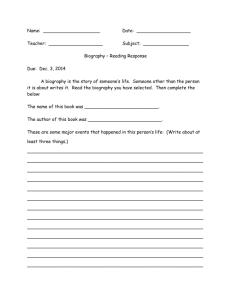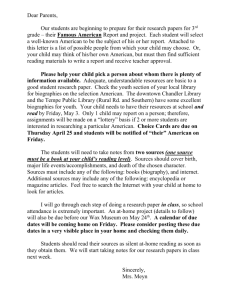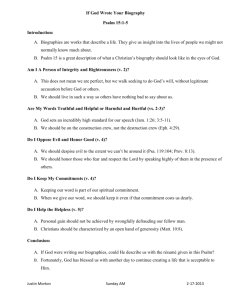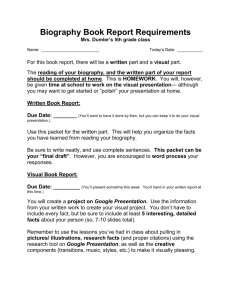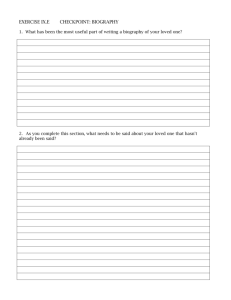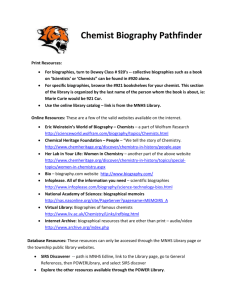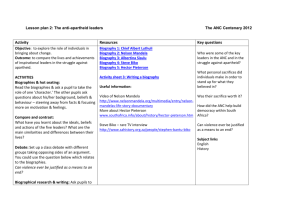How to Write a Biography
advertisement
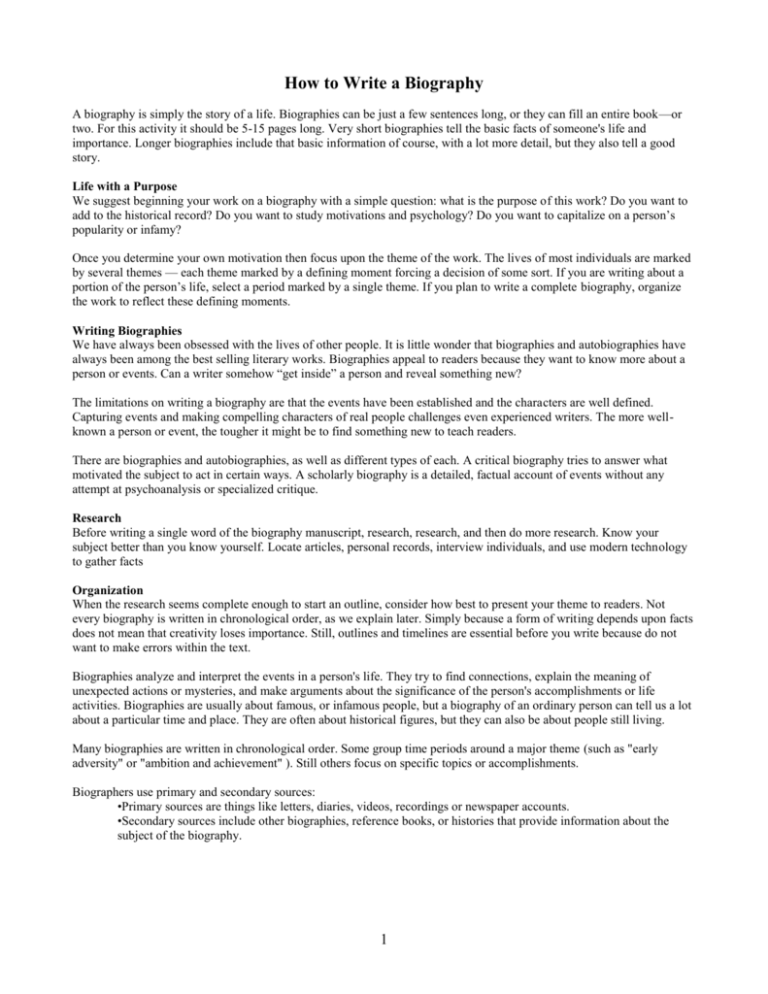
How to Write a Biography A biography is simply the story of a life. Biographies can be just a few sentences long, or they can fill an entire book—or two. For this activity it should be 5-15 pages long. Very short biographies tell the basic facts of someone's life and importance. Longer biographies include that basic information of course, with a lot more detail, but they also tell a good story. Life with a Purpose We suggest beginning your work on a biography with a simple question: what is the purpose of this work? Do you want to add to the historical record? Do you want to study motivations and psychology? Do you want to capitalize on a person’s popularity or infamy? Once you determine your own motivation then focus upon the theme of the work. The lives of most individuals are marked by several themes — each theme marked by a defining moment forcing a decision of some sort. If you are writing about a portion of the person’s life, select a period marked by a single theme. If you plan to write a complete biography, organize the work to reflect these defining moments. Writing Biographies We have always been obsessed with the lives of other people. It is little wonder that biographies and autobiographies have always been among the best selling literary works. Biographies appeal to readers because they want to know more about a person or events. Can a writer somehow “get inside” a person and reveal something new? The limitations on writing a biography are that the events have been established and the characters are well defined. Capturing events and making compelling characters of real people challenges even experienced writers. The more wellknown a person or event, the tougher it might be to find something new to teach readers. There are biographies and autobiographies, as well as different types of each. A critical biography tries to answer what motivated the subject to act in certain ways. A scholarly biography is a detailed, factual account of events without any attempt at psychoanalysis or specialized critique. Research Before writing a single word of the biography manuscript, research, research, and then do more research. Know your subject better than you know yourself. Locate articles, personal records, interview individuals, and use modern technology to gather facts Organization When the research seems complete enough to start an outline, consider how best to present your theme to readers. Not every biography is written in chronological order, as we explain later. Simply because a form of writing depends upon facts does not mean that creativity loses importance. Still, outlines and timelines are essential before you write because do not want to make errors within the text. Biographies analyze and interpret the events in a person's life. They try to find connections, explain the meaning of unexpected actions or mysteries, and make arguments about the significance of the person's accomplishments or life activities. Biographies are usually about famous, or infamous people, but a biography of an ordinary person can tell us a lot about a particular time and place. They are often about historical figures, but they can also be about people still living. Many biographies are written in chronological order. Some group time periods around a major theme (such as "early adversity" or "ambition and achievement" ). Still others focus on specific topics or accomplishments. Biographers use primary and secondary sources: •Primary sources are things like letters, diaries, videos, recordings or newspaper accounts. •Secondary sources include other biographies, reference books, or histories that provide information about the subject of the biography. 1 To write a biography you should: 1. Select a person you are interested in 2. Find out the basic facts of the person's life. Start with the encyclopedia and almanac. 3. Think about what else you would like to know about the person, and what parts of the life you want to write most about. Some questions you might want to think about include: 4. What makes this person special or interesting? 5. What kind of effect did he or she have on the world? other people? 6. What are the adjectives you would most use to describe the person? 7. What examples from their life illustrate those qualities? 8. What events shaped or changed this person's life? 9. Did he or she overcome obstacles? Take risks? Get lucky? 10. Would the world be better or worse if this person hadn't lived? How and why? 11. Do additional research at your library or on the Internet to find information that helps you answer these questions and tell an interesting story. Biography Questions 1. In what ways was the life remarkable? 2. In what ways was the life despicable? 3. In what ways was the life admirable? 4. What human qualities were most influential in shaping the way this person lived and influenced his or her times? 5. Which quality or trait proved most troubling and difficult? 6. Which quality or trait was most beneficial? 7. Did this person make any major mistakes or bad decisions? If so, what were they and how would you have chosen and acted differently if you were in their shoes? 8. What are the two or three most important lessons you or any other young person might learn from the way this person lived? 9. Some people say you can judge the quality of a person's life by the enemies they make. Do you think this is true of your person's life? Explain why or why not. 10. An older person or mentor is often very important in shaping the lives of gifted people by providing guidance and encouragement. To what extent was this true of your person? Explain. 11. Many people act out of a "code" or a set of beliefs which dictate choices. It may be religion or politics or a personal philosophy. To what extent did your person act by a code or act indepently of any set of beliefs? Were there times when the code was challenged and impossible to follow? 12. What do you think it means to be a hero? Was your person a "hero?" Why? Why not? How is a hero different from a celebrity? Issues of Style Every writer develops a personal style, especially for memoirs. There is a marked difference between writing about yourself and writing about others. In some ways, it is much easier to be humorous, mocking, or self-deprecating when writing an autobiographical work. As with stand-up comedy, pain and suffering hide behind the humor in many memoirs. Unless preparing an academic biography, a more casual style helps reach a wider audience. The more “conversational” a biographical work, the more approachable it is. Begin with a defining event, regardless of its chronology. Maintain consistent voice and style. Use dialogue or excerpts from historical records when possible. Describe all scenes as they relate to your protagonist — especially if you are the protagonist. Omit events and even people when they add nothing to the theme. End the biography with another defining moment, a personal revelation, or a recounting of the opening moment. 2 Format of Paper Recommendations here are based on the MLA Handbook for Writers of Research Papers. Paper: Use white, twenty-pound, 81/2- by 11-inch paper. Erasable paper tends to smudge and should be avoided for a final draft. Margins: Except for page numbers (see below), leave one-inch margins all around the text of your paper -- left side, right side, and top and bottom. Paragraphs should be indented half an inch; set-off quotations should be indented an inch from the left margin (five spaces and ten spaces, respectively, on standard typewriters). Spacing: The MLA Guide says that "the research paper must be double-spaced," including quotations, notes, and the list of works cited. Heading and Title: Your research paper does not need a title page. At the top of the first page, at the left-hand margin, type your name, your instructor's name, the course name and number, and the date -- all on separate, double-spaced lines. Then double-space again and center the title above your text. (If your title requires more than one line, double-space between the lines.) Double-space again before beginning your text. The title should be neither underlined nor written in all capital letters. Capitalize only the first, last, and principal words of the title. Titles might end with a question mark or an exclamation mark if that is appropriate, but not in a period Page Numbers: Number your pages consecutively throughout the manuscript (including the first page) in the upper right-hand corner of each page, one-half inch from the top. Type your last name before the page number. Most word processing programs provide for a "running head," which you can set up as you create the format for the paper, at the same time you are establishing things like the one-inch margins and the double-spacing. This feature makes the appearance and consistency of the page numbering a great convenience. Make sure the page-number is always an inch from the right-hand edge of the paper (flush with the right-hand margin of your text) and that there is a double-space between the page number and the top line of text. Do not use the abbreviation p. or any other mark before the page number. Tables and Figures: Tables should be labeled "Table," given an arabic numeral, and captioned (with those words flush to the left-hand margin). Other material such as photographs, images, charts, and line-drawings should be labeled "Figure" and be properly numbered and captioned. Binders: Generally, the simpler the better. Why spend money on gimmicky, unwieldy, slippery binders, when instructors prefer nice, flat stacks of papers they can stuff into their briefcases and backpacks? A simple staple in the upper left-hand corner of your paper should suffice. Revise Your Outline And Draft Read your paper for any content errors. Double check the facts and figures. Arrange and rearrange ideas to follow your outline. Reorganize your outline if necessary, but always keep the purpose of your paper and your readers in mind. Checklist One: 1. Is my thesis statement concise and clear? 2. Did I follow my outline? Did I miss anything? 3. Are my arguments presented in a logical sequence? 4. Are all sources properly cited to ensure that I am not plagiarizing? 5. Have I proved my thesis with strong supporting arguments? 6. Have I made my intentions and points clear in the essay? Re-read your paper for grammatical errors. Use a dictionary or a thesaurus as needed. Do a spell check. Correct all errors that you can spot and improve the overall quality of the paper to the best of your ability. Get someone else to read it over. Sometimes a second pair of eyes can see mistakes that you missed. 3 Checklist Two: 1. Did I begin each paragraph with a proper topic sentence? 2. Have I supported my arguments with documented proof or examples? 3. Any run-on or unfinished sentences? 4. Any unnecessary or repetitious words? 5. Varying lengths of sentences? 6. Does one paragraph or idea flow smoothly into the next? 7. Any spelling or grammatical errors? 8. Quotes accurate in source, spelling, and punctuation? 9. Are all my citations accurate and in correct format? 10. Did I avoid using contractions? Use "cannot" instead of "can't", "do not" instead of "don't"? 11. Did I use third person as much as possible? Avoid using phrases such as "I think", "I guess", "I suppose" 12. Have I made my points clear and interesting but remained objective? 13. Did I leave a sense of completion for my reader(s) at the end of the paper? Type Final Paper All formal reports or essays should be typewritten and printed, preferably on a good quality printer. Read the assignment sheet again to be sure that you understand fully what is expected of you, and that your essay meets the requirements as specified by your teacher. Know how your essay will be evaluated. Proofread final paper carefully for spelling, punctuation, missing or duplicated words. Make the effort to ensure that your final paper is clean, tidy, neat, and attractive. Aim to have your final paper ready a day or two before the deadline. This gives you peace of mind and a chance to triple check. Before handing in your assignment for marking, ask yourself: "Is this the VERY BEST that I can do?" 4
